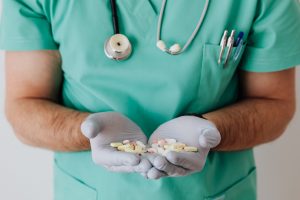 By: Jacqueline Bain
By: Jacqueline Bain
On November 3, 2020, Gilead Sciences Inc. filed suite in the Southern District of Florida Federal Court seeking damages from and injunctions against 58 defendants in South Florida for their part in an alleged scheme to defraud Gilead for millions of dollars. The defendants are comprised of medical clinics, laboratories, pharmacies and their owners, officers and employees.
Gilead is a pharmaceutical company that develops and manufactures drugs for the prevention and treatment of HIV, AIDS, hepatitis B and hepatitis C. Gilead has created a medication assistance program that provides eligible uninsured persons with free medication to help protect them from becoming infected with HIV. Gilead alleges that the defendants are exploiting the program’s charitable purpose for their own financial gain, endangering patients in the process.
The alleged scheme is complex and involves a lot of people participating in a wide-spread conspiracy, yet is exactly the type of convoluted scheme that regulators and insurance companies target. If the allegations are true, nearly 60 fraudulent operators will have to find another line of business. The OIG is likely to be following this very closely to determine if federal charges should follow.
The alleged scheme is as follows:
1. Medical clinics recruit individuals who earn low incomes or are homeless to serve as patients.
The defendant medical clinics employ van drivers who search for low income or homeless persons who they can convince to come to the clinic for so-called “wellness checks.” In exchange for the person’s participation, the clinic pays the patient a small fee.
2. Medical clinics prescribe those patients medically unnecessary medications.
The van drivers bring the patients to the medical clinic, where the patient has blood tests and a wellness check with a doctor or nurse practitioner. As a result of these wellness checks, the clinic prescribes HIV or AIDS medication or prevention medication to the patient.
3. Medical clinics then falsely certify to Gilead that the prescriptions are medically necessary.
The clinic and the prescribers certify to Gilead that the medication is medically necessary for the patient, will be used as directed, and that the prescriber will supervise the patient’s treatments. The CDC advises that healthcare providers should follow up with patients every three months to conduct any necessary tests, assess the individual’s continued risk of HIV infection, and answer any questions. Gilead alleges that the medication is often not medically necessary, will not be used as directed, and that the patient will not be supervised.
4. Medical clinics seek reimbursement from Gilead for the cost of those medications.
Gilead’s program reimburses medication dispensed and also pays the dispensing pharmacy a dispensing fee. Because the clinic participates in the U.S. government’s 340B Drug Pricing Program, the medical clinics pay a steeply discounted price for each bottle of medication that they buy. The 340B Drug Pricing Program is designed to expand patient access to essential medication – including HIV and AIDs medications and prevention medications – at reduced costs.
5. Medical clinics unlawfully remove the medication from its original packaging, separate it from its original labeling, and repackage it prior to dispensing it to the recruited patient.
Federal laws and regulations provide that these medications must be dispensed only in their original packaging (which is designed to prevent degradation or contamination of the tablets) and accompanied by their approved labeling and package insert (which contain warnings necessary to avoid adverse reactions). Moreover, the manufacturing lot numbers are printed on each bottle for quality control and recalls.
The medical clinics arrange to receive the medication on behalf of their patients, and offer patients an additional small payment each time they return to retrieve the prescribed medication, allegedly to secure additional reimbursements from Gilead for the “refills” and to create an audit trail. In many instances, the recruits do not return to pick up their medication, but the Clinic refills it anyway, stockpiling the medication. The pharmacy removes the medication tablets from their packaging, separate them from their FDA-approved instructions for use, and place them in generic bottles. This renders them “misbranded drugs” under federal law, which are unlawful to possess, sell, or distribute. Sometimes, the clinic redispenses the misbranded drugs to obtain a second wrongful reimbursement.
6. Medical clinics repurchase the medications back from patients at a discount so they can be resold at a higher price on the black market. After patients finish their sham “wellness checks,” are enrolled in the program, and receive the medication, the medical clinic will offer to buy the medication back from the patient for as little as $10, encouraging the patient to sell the medication by claiming that it may have dangerous side effects. Many patients, who earn little income and need the money, accept the offer.
Gilead finally alleges that the medical clinics’ van drivers offer the patients an additional $10 to go to a different medical clinics and repeat the same process from the beginning.
Gilead’s lawsuit seek an injunction that prohibits the defendants from participating in Gilead’s medication assistance program, and from further participating in the scheme set forth above. Should the allegations be true, then the net effect of the scheme is that the defendants diverted resources and discounts for expensive medication away from uninsured low-income Americans who actually really need them.
